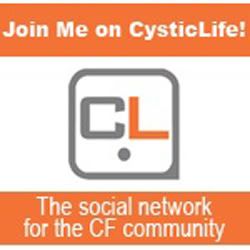Question:
So I know I've read things in your blog and have heard stories of CFers who had lung functions in their 30s and somehow managed to get it all the way back up to the 50s, 60s or even 70s. I'm pretty sure I even saw that you yourself were down in the 30s at one point. Do you have any idea how people (or yourself) have gained so much lung function back? How many breathing treatments a day does it take? How many hours of exercise? How much of a miracle?
Last year I was training for a marathon with my lung function in the high 60s, doing great. In July, I ended up being rushed into emergency surgery for a bowel obstruction and twisted intestine and a month afterward my lung function plummeted to the 20s and 30s. A year later I still can't recover. My lung function is now 27% and I'm going next month to meet a transplant team. It's super disappointing to have your feet knocked out from under you like that and even more disappointing when I've quadrupled my breathing treatments, tried exercising my butt off, and prayed every night for a miracle to no avail. I know there's a point when you're lungs can't repair themselves, but I also just can't believe that could happen in ONE month after surgery. I'm just wondering if there is something else I could be doing that others have done.
Answer:
Thank you for taking the time to send me an email. Hopefully I can help you in some way :)
Generally, the people I see bounce back from lower lung function are from 3 camps -
1) Never took care of themselves, almost died and got scared into changing
2) Took okay care of themselves, got in a routine that didn't change much, slower decline and then finally realized that if they continued doing what they were doing they were going to die
3) Took great care of themselves, hit a rough patch or a big event, sharp decline and then bounced back after changing a few things up.
There is of course other situations out there, but these are the three main ones that I see. There are also some who experience one or more of these situation during the course of their lifetime (If your curious, I was mainly #2).
To answer your direct questions, it's generally increased breathing treatments and a regular, intense and consistent exercise regiment that gives people the best chance to bounce back. For me, it took 18 months of running 6 days a week and doing 4 treatment sets a day (4 to 6 hours devoted to CF care) for me to go from a 50% to a 75% (I went into the hospital in the 20's and after a week in ICU I blew a 31%). I've been able to maintain my 75% by doing 3 to 4 treatment sets a day and exercising 6 days a week for the last 3 years. I devote 1 to 2 hours a day to some type of exercise and/or physical activity.
It's funny that you mention the bowel obstruction as the catalyst for you to see a sharp decrease in lung function. One of my largest declines in lung function also came after a bowel obstruction and removal of part of my small intestine. I've been able to get most of that lung function back, but it's been over a decade (obviously a lot happened in the last ten years, and much of it was me not taking great care of myself, or as some people call it, college.)
With all of that said, here's my advice: Put yourself in the best position to succeed in and every day. Treat each day as a new day to be your absolute best and better than the person you were the day before. Don't get discouraged by the numbers. It's much more important how you feel. If you don't think you can push anymore, push harder. A lot of gain can be made during the time of resistance. Sleep is just as important as activity. This doesn't mean that you sleep the day away, but it does mean that you may not be able to have any late nights for a while. I always found that my best mucus clearing workouts came first thing in the morning as the sun was rising! If your aren't seeing the results you want, either by the way you feel or by the numbers, change up your routine (medications, exercises, treatments, breathing techniques, etc). And probably most importantly, never accept a place you don't want to be and never stop pushing until you hit your ceiling. How do you know you have hit your ceiling? You never will, so that means you're in this for the long haul. The only way I'll know that I maxed out is after I'm dead; know what I'm saying?
If you do what I outlined above, and you still don't see the results you'd like, that's okay! You'll still have your head held high because you know you gave it your best shot. Remember, failure only occurs when you don't try. If you try, no matter the result, you're a winner.
Please let me know if you have anymore questions!!
.............
If you have any questions that you'd like to send my way, please email me at ronnie@cysticlife.org!










